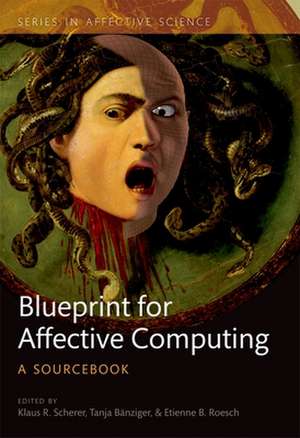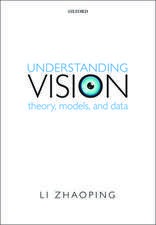A Blueprint for Affective Computing: A sourcebook and manual: Series in Affective Science
Editat de Klaus R. Scherer, Tanja Bänziger, Etienne Roeschen Limba Engleză Hardback – 22 sep 2010
Din seria Series in Affective Science
- 34%
 Preț: 603.88 lei
Preț: 603.88 lei - 25%
 Preț: 607.65 lei
Preț: 607.65 lei - 30%
 Preț: 471.72 lei
Preț: 471.72 lei - 19%
 Preț: 440.36 lei
Preț: 440.36 lei - 27%
 Preț: 451.09 lei
Preț: 451.09 lei - 27%
 Preț: 456.59 lei
Preț: 456.59 lei - 30%
 Preț: 503.55 lei
Preț: 503.55 lei - 27%
 Preț: 426.69 lei
Preț: 426.69 lei - 30%
 Preț: 587.51 lei
Preț: 587.51 lei - 27%
 Preț: 334.08 lei
Preț: 334.08 lei - 27%
 Preț: 385.07 lei
Preț: 385.07 lei - 30%
 Preț: 530.44 lei
Preț: 530.44 lei - 28%
 Preț: 496.81 lei
Preț: 496.81 lei - 27%
 Preț: 477.84 lei
Preț: 477.84 lei - 26%
 Preț: 818.22 lei
Preț: 818.22 lei - 30%
 Preț: 477.84 lei
Preț: 477.84 lei - 28%
 Preț: 462.28 lei
Preț: 462.28 lei - 22%
 Preț: 495.98 lei
Preț: 495.98 lei - 27%
 Preț: 414.59 lei
Preț: 414.59 lei - 27%
 Preț: 497.60 lei
Preț: 497.60 lei - 21%
 Preț: 757.24 lei
Preț: 757.24 lei -
 Preț: 323.55 lei
Preț: 323.55 lei - 27%
 Preț: 473.14 lei
Preț: 473.14 lei - 33%
 Preț: 528.71 lei
Preț: 528.71 lei - 28%
 Preț: 497.48 lei
Preț: 497.48 lei - 27%
 Preț: 453.99 lei
Preț: 453.99 lei - 30%
 Preț: 402.82 lei
Preț: 402.82 lei - 34%
 Preț: 738.95 lei
Preț: 738.95 lei - 25%
 Preț: 694.82 lei
Preț: 694.82 lei - 27%
 Preț: 675.29 lei
Preț: 675.29 lei - 24%
 Preț: 482.71 lei
Preț: 482.71 lei - 26%
 Preț: 397.75 lei
Preț: 397.75 lei - 27%
 Preț: 610.66 lei
Preț: 610.66 lei
Preț: 780.16 lei
Preț vechi: 1177.91 lei
-34% Nou
Puncte Express: 1170
Preț estimativ în valută:
149.33€ • 162.26$ • 125.52£
149.33€ • 162.26$ • 125.52£
Carte tipărită la comandă
Livrare economică 09-15 aprilie
Preluare comenzi: 021 569.72.76
Specificații
ISBN-13: 9780199566709
ISBN-10: 0199566704
Pagini: 408
Dimensiuni: 175 x 256 x 28 mm
Greutate: 0.88 kg
Editura: Oxford University Press
Colecția OUP Oxford
Seria Series in Affective Science
Locul publicării:Oxford, United Kingdom
ISBN-10: 0199566704
Pagini: 408
Dimensiuni: 175 x 256 x 28 mm
Greutate: 0.88 kg
Editura: Oxford University Press
Colecția OUP Oxford
Seria Series in Affective Science
Locul publicării:Oxford, United Kingdom
Notă biografică
Klaus Scherer, born in 1943, studied economics and social sciences at the University of Cologne and the London School of Economics. Following his postgraduate studies in psychology, he obtained a Ph.D. from Harvard University in 1970. After teaching at the University of Pennsylvania, Philadelphia, and the University of Kiel, Germany, he was appointed, in 1973, full professor of social psychology at the University of Giessen, Germany. From 1985 to 2008, Klaus Scherer has held the chair of emotion psychology at the University of Geneva, Switzerland, with teaching and research activities focussing on the areas of emotion, stress, motivation, personality, and organisational behaviour. Klaus Scherer is currently the Director of the Swiss National Centre of Competence in Research for the Affective Sciences, established by the Swiss government and the Swiss National Science Foundation, and of its leading house at the University of Geneva, the Interfaculty Centre for Affective Sciences.Tanja Bänziger studied psychology in Switzerland (Lausanne and Geneva). She obtained a PhD in thevocal communication of emotion in 2004. For her post-doc she worked on the recognition of emotionin face and voice. She currently teaches at Högskola i Gävle.Dr. Roesch started as a professional software engineer, before completing undergraduate and postgraduate studies in cognitive science. He completed his undergraduate research track record by joining the Affective Neuroscience Laboratory, at Harvard University, as a Research Assistant. In 2004, he joined Prof. Scherer's lab to pursue a PhD in psychology investigating the unfolding of attentional resource to the processing of emotionally-relevant information. In 2008, he was awarded a fellowship by the Swiss National Science Foundation to join the Computing Dept. at Imperial College, where he contributed to the development of NeMo, a modelling platform of spiking neurons using high-performance Graphics Processing Units (GPU). In 2010, he joined the Centre for Integrative Neuroscience and Neurodynamics, on a project aiming at bridging the gaps between neuroimaging and modelling. Dr. Roesch is also an associate lecturer in Oxford Brookes University, where he teaches cognitive neuroscience.













